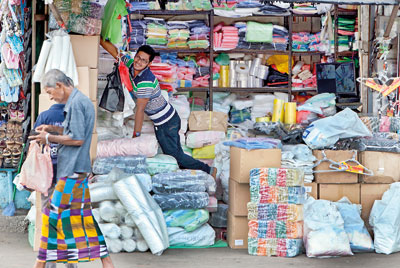News
Plastic industry claims and lobbying intensify, but regulator insists ban stays
Some progressive restaurant operators are embracing the ban on polythene by using alternatives, while others say they are unprepared for the ban next month. Polythene manufacturers are continuing to lobby in the media and elsewhere to protect their interests ahead of September 1 and force the government to back down.

Polythene bags for sale at a shop in Pettah. Pix by Sameera Weerasekera
The All Ceylon Apana Salawa Sangamaya said alternatives are limited, saying materials such as banana leaves are not widely available.
The group claims that using thicker lunch sheets cost three times more and the cost will have to be passed on to consumers.
The Polythene Manufacturers and Recyclers Association said talks are continuing with the Central Environment Authority on using ‘oxo-biodegradable’ polythene, president, Anura Wijethunge said.
He charged that the government was listening to multi-national companies with their own agendas.
But the plastic industry has also been accused of promoting its own agenda. Major multinational chemical companies are backing this industry, including as sponsors.
The industry is now promoting through the media, the so-called ‘oxo-biodegradable’ polythene and claim the material degrades quickly. They are lobbying for a five-year transition period and argue that the lunch sheet ban is impractical. They are also using academics to present a favourable message in the media.
On its Facebook page the polythene makers have announced a protest on Monday from People’s Park at 1:30pm.
Sri Lanka meanwhile, is grappling with millions of metric tonnes of plastic waste. Each Sri Lankan wastes more plastic every day than an individual in China, international studies show.
Sri Lankans and NGOs believe prevention of plastic waste is better.
The CEA is insisting on hydro biodegradable polythene, but manufacturers suggest ‘oxo-biodegradable’ polythene is easy to manufacture and cost-effective. “It will cost only 10% more than polythene bags and lunch sheets available,’’ Mr Wijethunga said.
He said most manufacturers are concerned. “This is the preparatory season for the year-end where huge orders come for Christmas and new year festivals.’’
Wijethunga claimed some manufacturers will have to close.
Meanwhile, popular takeaway food outlets have a mixed reaction to the ban. While many popular outlets refrained from comment, others said they are optimistic that the government will backtrack.
Central Environment Authority, director general, J M U Indraratne insisted that it is not the case and the ban on polythene will start on September 1. “There will be no change in the decision,’’ he said.
But Kushmi Foods believes in a U-turn. “The manufacturers are talking and we hope for a change in the decision,’’ director Jayantha Bogawatte said.
The Pagoda Tea Room, general manager, Edwin Gunasekera, said the outlets will use food grade brown paper bags and laminated food grade brown paper as lunch sheets. “They are in use in many countries. We are trying our best to conserve the environment,’’ he said.
The material is being used in the new branch in Moratuwa. “We might start using it in all our outlets even before September,’’ he said.
Manufacturers of food grade brown paper bags say order books are filling up.
W U Seneviratne & Co, chairman, Seneviratne said: “There is a demand and we are unable to meet the requests. If this continues we are ready to expand.’’
| ‘OXO-BIODEGRADABLE’ PIECES REMAIN IN ENVIRONMENT | |
| Referring to so-called ‘oxo-biodegradable’ or ‘oxo-degradable’ by manufacturers, the European Union has cautioned that it is not what it promises to be. They do not bio-degrade. Instead they break down into small pieces.These, in fact, increase pollution of the environment, the EU explains.In bags made of these materials, additives are incorporated into conventional plastics. Because of the additives, the plastic breaks down over time into small particles which remain in the environment, the EU warns. “It can thus be misleading to refer to such bags as ‘biodegradable’ as they may not be a solution to littering and may, on the contrary, increase pollution.Spain has announced a ban on lightweight ‘oxo-degradable’ bags from 2018 to comply with an EU directive to reduce the use of lightweight plastic carrier bags. France has also banned these.“‘Oxo-degradable plastic carrier bags’ shall mean plastic carrier bags made of plastic materials that include additives which catalyse the fragmentation of the plastic material into micro-fragments,’’ the EU explains. |

